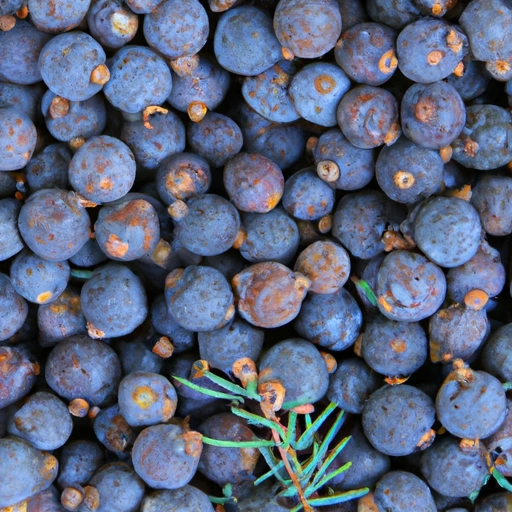Juniper Berry
Description

Juniper berry is not actually a true berry but the seed cone from various species of junipers, which are coniferous plants. These small, round cones resemble berries with their fleshy and merged scales, which gives them a berry-like appearance. Juniper berries are renowned for their distinctively sharp, clear flavor with piney, peppery, and citrus notes. They are a common ingredient in European cuisine and are used to flavor gin and other spirits.
Common uses
Often used in European cuisines, especially in the culinary traditions of Scandinavia, Eastern Europe, and the Mediterranean, juniper berries add a sharp, clear flavor to dishes. They are also a key botanical in gin production and are used to flavor meats, sauces, and stuffings.
Nutritional value
Calories
A tablespoon (about 2 grams) of juniper berries contains approximately 6 calories (25 kJ).
Protein
Juniper berries contain a trace amount of protein, less than 0.1 grams per tablespoon.
Fat
These berries are low in fat, with less than 0.1 grams per tablespoon.
Carbohydrates
Juniper berries consist of about 1 gram of carbohydrates per tablespoon, which includes a small amount of dietary fiber.
Vitamins
They provide small amounts of vitamin C and B vitamins.
Minerals
Juniper berries contain minerals such as iron, copper, and calcium, though in trace amounts.
Health benefits
Juniper berries are believed to have diuretic properties and have been used traditionally to treat urinary tract infections and kidney stones. They also contain antioxidants, which can help in protecting the body from oxidative stress.
Potential risks
When consumed in large quantities, juniper berries can cause kidney irritation and should be avoided during pregnancy. As with any ingredient, some individuals may have an allergic reaction to juniper berries.
Common recipes
Juniper berries are commonly used in European dishes like sauerkraut, German Sauerbraten, and Swedish meat dishes. They are also used in marinades and as a spice for game meats.
Cooking methods
The berries are often crushed to release their flavors and can be used in a dry rub, incorporated into a brine, or added to a stew or sauce as it cooks.
Pairing with other ingredients
Juniper berries pair well with wild game, pork, lamb, duck, and even certain fish. They also complement vegetables like cabbage and fruits such as apples and pears.
Summary
Juniper berries, with their distinctive flavor profile, are a versatile ingredient used across various European cuisines. They contribute both nutritional value and unique flavors to dishes and beverages. While juniper berries offer certain health benefits, they should be used in moderation due to potential risks, particularly for individuals with kidney issues or pregnant women.